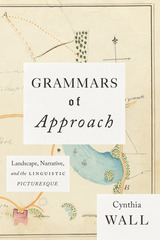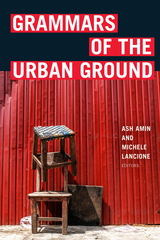2 books about Grammars

Grammars of Approach
Landscape, Narrative, and the Linguistic Picturesque
Cynthia Wall
University of Chicago Press, 2019
In Grammars of Approach, Cynthia Wall offers a close look at changes in perspective in spatial design, language, and narrative across the late eighteenth and early nineteenth centuries that involve, literally and psychologically, the concept of “approach.” In architecture, the term “approach” changed in that period from a verb to a noun, coming to denote the drive from the lodge at the entrance of an estate “through the most interesting part of the grounds,” as landscape designer Humphrey Repton put it. The shift from the long straight avenue to the winding approach, Wall shows, swung the perceptual balance away from the great house onto the personal experience of the visitor. At the same time, the grammatical and typographical landscape was shifting in tandem, away from objects and Things (and capitalized common Nouns) to the spaces in between, like punctuation and the “lesser parts of speech”. The implications for narrative included new patterns of syntactical architecture and the phenomenon of free indirect discourse. Wall examines the work of landscape theorists such as Repton, John Claudius Loudon, and Thomas Whately alongside travel narratives, topographical views, printers’ manuals, dictionaries, encyclopedias, grammars, and the novels of Defoe, Richardson, Burney, Radcliffe, and Austen to reveal a new landscaping across disciplines—new grammars of approach in ways of perceiving and representing the world in both word and image.
[more]

Grammars of the Urban Ground
Ash Amin and Michele Lancione, editors
Duke University Press, 2022
The contributors to Grammars of the Urban Ground develop a new conceptual framework and vocabulary for capturing the complex, ever-shifting, and interactive processes that shape contemporary cities. Building on Marxist, feminist, queer, and critical race theory as well as the ontological turn in urban studies, they propose a mode of analysis that resists the staple of siloed categories such as urban “economy,” “society,” and “politics.” In addition to addressing key concepts of urban studies such as dispossession and scale, the contributors examine the infrastructures of plutocratic life in London, reconfigure notions of gentrification as a process of racial banishment, and seek out alternative archives for knowledge about urban density. They also present case studies of city life in the margins and peripheries of São Paulo, Kinshasa, Nairobi, and Jakarta. In so doing, they offer a foundation for better understanding the connective and aggregative forces of city-making and the entanglements and relations that constitute cities and their everyday politics.
Contributors. Ash Amin, Teresa Caldeira, Filip De Boeck, Suzanne Hall, Caroline Knowles, Michele Lancione, Colin McFarlane, Natalie Oswin, Edgar Pieterse, Ananya Roy, AbdouMaliq Simone, Tatiana Thieme, Nigel Thrift, Mariana Valverde
Contributors. Ash Amin, Teresa Caldeira, Filip De Boeck, Suzanne Hall, Caroline Knowles, Michele Lancione, Colin McFarlane, Natalie Oswin, Edgar Pieterse, Ananya Roy, AbdouMaliq Simone, Tatiana Thieme, Nigel Thrift, Mariana Valverde
[more]
READERS
Browse our collection.
PUBLISHERS
See BiblioVault's publisher services.
STUDENT SERVICES
Files for college accessibility offices.
UChicago Accessibility Resources
home | accessibility | search | about | contact us
BiblioVault ® 2001 - 2024
The University of Chicago Press









